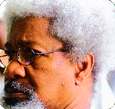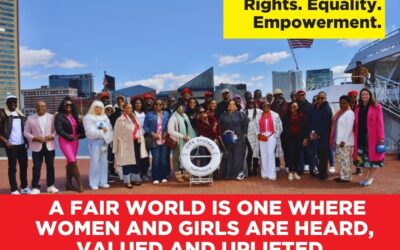The South African nation-building process took into cognition the realities of the history of that occupied space. The embodiment of the state was that of a minority, but the massive component of the nation was excluded.. Today, despite the sad reality that, owing to numerous factors, largely internal but also as a consequence of that process, that nation-being is disintegrating from within. One continues to pray that that process can be stemmed. The lesson from that yet enduring process however is that South Africa took into consideration the identities whose existence gave rise to the need for nation creation. With that example in mind, are we saying that the gap between the Boer overlord of South Africa and the black constituency is much closer than the gap between the numerous ethnic nationalities that occupy Nigeria’s nation space? This would be nothing but a romanticisation of black African being on this continent. Let me rephrase that question. The micro-nationality that was known as Boers was miles apart from the kwaZulu, Ndebele, and other ethnic nationalities of South Africa, miles apart from usage, class, opportunity, wealth, and race. Yet the leadership of the majority identities recognized that they must be brought into nation discourse, engaged them creatively in a series of exchanges, from which emerged a constitution that has held, a constitution that cannot be held responsible for the internal social collapse from which we hope that South Africa will yet rescue herself.
Wherein lies the inhibition? What is the problem of recognizing that, in the Nigerian instance for instance, there is a need to gather and negotiate – but in full freedom – not hiding under the skirts of those who designated the nation space what it is today – what a humiliation! – but saying to one another: something is askew, and that something may be due to our beginning, to our antecedents. There is a palpable falsity about our existence, one whose bottom has fallen out, a falsity at whose doors can be laid the intermittent eruptions of a devastating nature, one that has left us questioning – just what are we? To make matters worse, there are highly motivated individuals who treasure that falsity, who exploit it, manipulate it, form alliances of self-interest that fool the committed entities in society, who pander to the basest, the most atavistic and primitive instincts of the unconscionable of the nation constituents, who have the interest only of their individual selves, or else their quite numerically insignificant but organized band of exploiters. Yes, it is from such individuals and groups that we hear, loudest of all, those time-worn, meaningless jargons of ‘national sovereignty’, ‘territorial integrity’ plus extended versions in sabre-rattling forms – ‘the sacred mandate of our incumbency is that the unity of this nation be not compromised.’ Please, what unity? Just who undermines the unity? Who are those that systematically, religiously undermined the putative unity of the nation space? No, not those who gather to re-examine the protocols of association. It is those who prevent such gatherings, those who attempt to circumvent it with their own reductionist proceedings. It is those who, like the proverbial poison rodent known in my part of the world as asin – breathe soothing air on the spot from which they are about to, or have just taken a chunk of your flesh.
Let no one misunderstand, from the attention we have given to the protocols of co-existence, that this alone is the route to nationhood. Constitution is only a part of the story. Sometimes there are events, even of a fortuitous nature, such as a concerted resistance to external aggression and domination, that can forge such organic bonds of common identity, survival and internal consolidation, that the nation space becomes, virtually overnight, a nation. An election, in very special circumstance, can prove such a catalyzing agency. On June 12, 1983, this nation space did have a chance to claim the beginnings of nation-being. Would we have emerged effectively as a nation? I am no prophet and have no interest in hindsight. I insist however that the nation claim did stand a chance of embarking on the route to affirmation. A democratic election, let me repeat again and again, is only one of the several means – as witness the very special case of post-apartheid South Africa. Most nations we know of on this continent cannot even boast of one defining moment, a most when the possibility of nation actualization was handed to them. Our chance came to us on June 12 1983, and we blew it. We? No. I do not believe in collective guilt. The insincerity, indeed hypocritical, double-talking conduct of a handful of individuals, their abuse of the trust of the nation, scattered the hopes of that moment of nation-becoming. A candidate – may I please remind you? – won a mandate across the landscape, defeating his opponent, in a contest universally adjudged to be absolutely fair. That candidate, that aspirant to the mantle of state defeated his opponent even in that opponent’s most intimate constituency – his local ward. Now let anyone tell me that this did not resound like the starting-pistol of a nation race, a marathon of course, not a sprint, but a leap forward from the starting-block after so many false starts, several of them deliberately planned and cynically executed.
General Ibrahim Babangida, then embodiment of the state, has finally opened up and conceded the undeniable – that election was true, and a victor emerged. History has taken note of his confessions and History sits in judgment, no matter what excuses are invoked by him. None is acceptable, least of all the totally incongruous plea that he, as the then Head of State, feared that that nation enterprise would be aborted by a military coup. I find that plea an afterthought, and unconscionable. His loss of nerve – if that is what it was indeed – constituted a gross act of governance dereliction at its most generous level. There were consequences. There were casualties. Some of this I have recounted in my memoirs, YOU MUST SET FORTH AT DAWN. Nigerians perished. I do not speak from records as I was a witness, a participant in those days of nation wrath and state intransigence. My calling is not that of a soldier, so I do not deal in comparative statistics. I concern myself with sacrifice, especially needless, avoidable sacrifice. Those who instigate sacrifice through failure of their watch must also understand that survivors will demand of them their own sacrifice in turn, certainly the sacrifice of their personal ambitions. That is indeed a small sacrifice compared to the terminal sacrifice of hundreds of innocents.
Now, that event unleashed, in short space, the ultimate desecration of both nation and state on the Nigerian people. Indeed, we thought that was the ultimate, and said so. How wrong we were. Along came a successor, and then, people like me who deal in words were left bereft of ammunition – we had expended it all on what we thought was the very end of the nation antithesis, the state as ego, as a solipsistic aberration, filled with all the criminalities that we associate with power gone berserk – I refer to the rampaging reign of Sanni Abacha. We will not permit this nation to forget the further years of sacrifice and loss that it underwent.
And then what? Along came the Messiah who had trumpeted to the nation that the individual of their choice was not the Messiah they awaited. We know the state will never put him on trial, and therein lies the lesson that we must impart to the nation, the true separation of functional entities and the assumption of There comes a point when the nation says: the state is dead; let the nation advance.
I cannot end without mentioning, albeit briefly, the increasing reactionary role of the Religious factor. Religion is one enemy of potential statehood that requires, not just a separate address of its own, but a full week, even a month of seminars, lectures, expositions, artistic events, films and documentaries – but all of a frank, even brutal nature, since the intervention of religion in nation being has been of the most savage, unconscionable kind. No other word for it but butchery, waste and devastation. We cannot continue pretending that, as long as any one religion aspires to a condition of super-arrogation in secular choices, we can call ourselves a nation. Challenging the state is one thing – that challenge is unending and purifying. It can emerge from any group-interest of whatever identification within a nation. Challenging the nation itself however is another, and intolerable, since such a contest disputes the rights of other group-interests to co-exist except under submission of the whole to the part. A theocratic order is anathema to nation-being since it implicates exclusion, not inclusivity. Any religious following can evoke a parallel but opposing set of protocols for the privilege of co-existence, citing the authority of some unseen and unknowable god in spiritual realms that has no perceptible contact with the actual. Religion must therefore submit to community, to nation, otherwise co-existence becomes impossible and the human entity reverts to a state of brutishness.
And thus: Is Nigeria a nation today? My answer is Not yet. Is Nigeria aspiring to be a nation? The answer is – perhaps. Nominally of course, admittance into an organization known as the United Nations confers on Nigeria, among others, the status of nationhood, but that is about all. Misnomers exist in the world and people live quite contentedly under false labels. Sometimes it is quite conforting to live under an illusion.
If it is any consolation however – let us simply remember – we are not alone. That way, we may sleep more soundly at nights and open our eyes at dawn on the vision of nationhood on the horizon, hopefully not receding, indeed, almost within grasp, requiring only the concerted will of a people who reject the illusion of mere dreams.
Wole Soyinka


![[PRESS RELEASE] AFFIRMATION OF EMERGENCY RULE IN RIVERS STATE THROUGH “AYES AND NAYS”](https://www.nas-int.org/wp-content/uploads/2025/03/National-Assembly-Ayes-and-Nays-400x250.jpeg)

